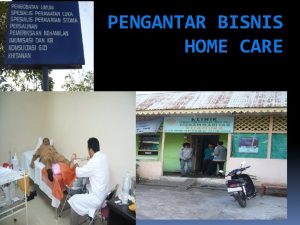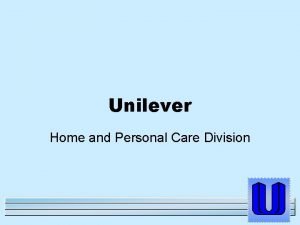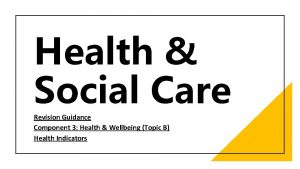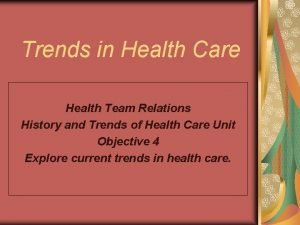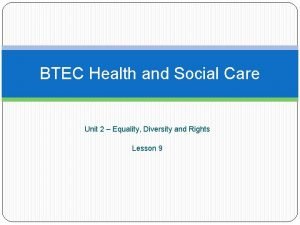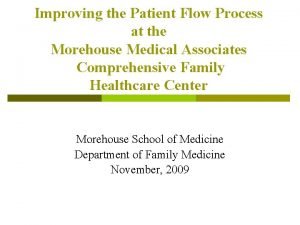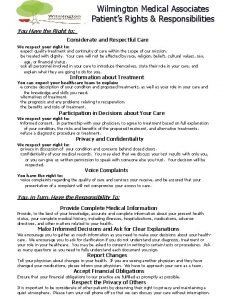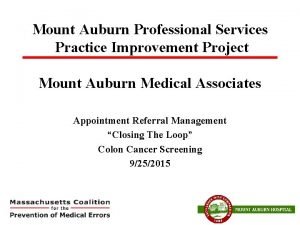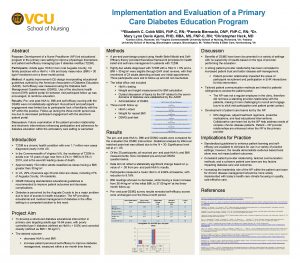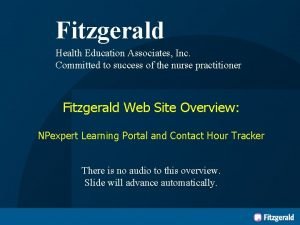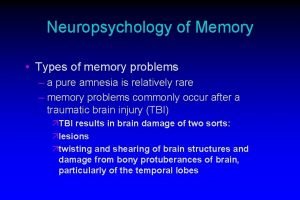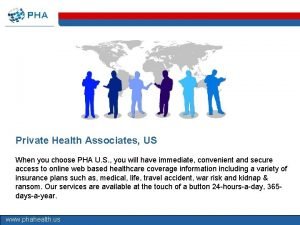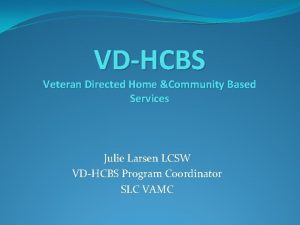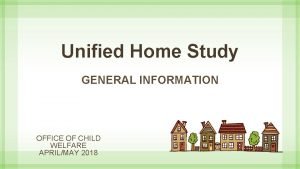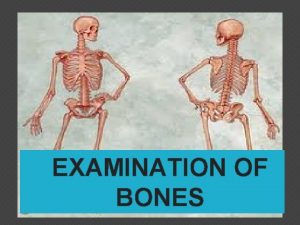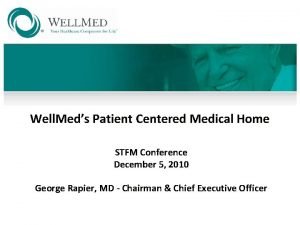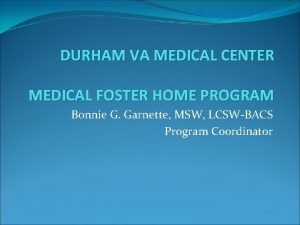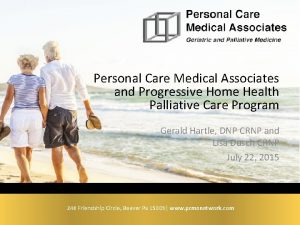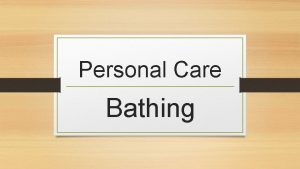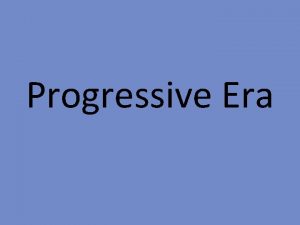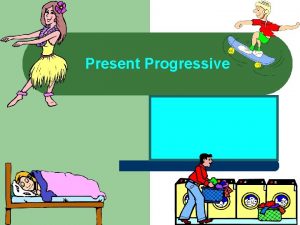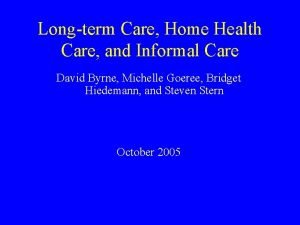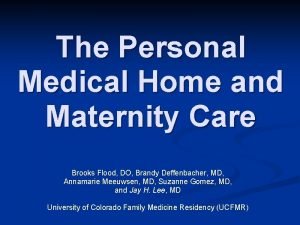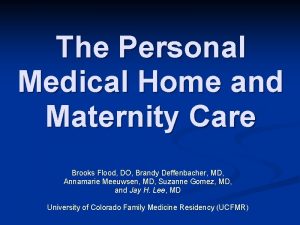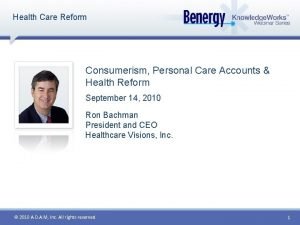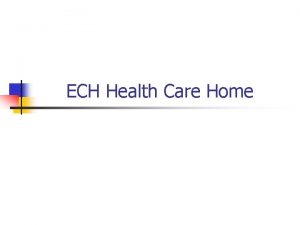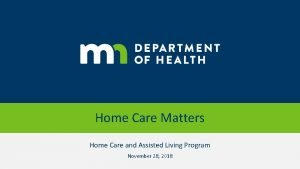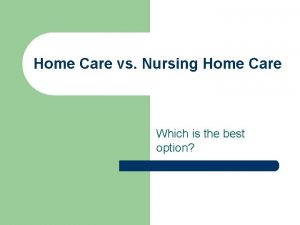Personal Care Medical Associates and Progressive Home Health



































- Slides: 35

Personal Care Medical Associates and Progressive Home Health Palliative Care Program Gerald Hartle, DNP CRNP and Lisa Dusch CRNP July 22, 2015 246 Friendship Circle, Beaver Pa 15009| www. pcmanetwork. com

Objectives • Overview of the Personal Care Medical Associates (PCMA) and Progressive Palliative Care Program • Define Palliative Care • Identify Palliative Care Consult triggers • Understand the Process of Palliative Care Consult from patient identification to follow up • Understand the different settings of Palliative Care • Describe the communication between PCMA and Progressive Home Health. • Identify Quality outcomes that may be tracked in the future. 246 Friendship Circle, Beaver Pa 15009| www. pcmanetwork. com

Who is PCMA? – Started in 2001 by Dr. Thimons and Jay Hartle, DNP CRNP • Visited patients in 3 assisted living facilities and 6 skilled nursing facilities • Research 246 Friendship Circle, Beaver Pa 15009| www. pcmanetwork. com

Who is PCMA? • Today – 4 Physicians and 3 NPs – Patients seen in 2 nursing homes and 1 assisted living, LTAC, and one hospital – Home visit/transitional care visits after discharge from facility – Research – And now…. a Palliative Program, partnering with Home Health 246 Friendship Circle, Beaver Pa 15009| www. pcmanetwork. com

Why the Changes? • Changes in healthcare: – Decreased length of stay in hospital and SNF – Focus on decreasing 30 day readmissions – Patient satisfaction – Increase in patients with end stage disease – meaning sicker home health patients that have increased difficulty getting to their PCP office – Cost of health care 246 Friendship Circle, Beaver Pa 15009| www. pcmanetwork. com

What do we do with these changes? Initiate a Home Palliative Care Program by partnering with Progressive Home Health Services. How is this program different from others? 1. Patients are identified in different settings. 2. Collaboration with Home Health Services. 3. Patients receive a visit from PCMA provider in their home. 4. Communication about patients and visits will be provided to Home Health, PCP, and other entities as needed. 246 Friendship Circle, Beaver Pa 15009| www. pcmanetwork. com

PCMA/Progressive Palliative Care Program • How is a patient referred to Palliative Care? Referrals may originate in the following care settings: 1) Hospital 2)Skilled Nursing Facility 3) Home Health 4) Other: PCP/Specialist referral, Family, Insurance Provider 246 Friendship Circle, Beaver Pa 15009| www. pcmanetwork. com

Patient Location: Reason for Referral: Patient Transferred To: Care Provided: 246 Friendship Circle, Beaver Pa 15009| www. pcmanetwork. com

• Hospital Referral: – Palliative Care Consult – patient/family is seen inpatient. Plan of care and POLST are reviewed, information is shared with attending and specialists. – After discharge from hospital: • • Home discharges will have an Physician/CRNP visit. Follow up with PCP. Home Health Care Possible referral to Hospice 246 Friendship Circle, Beaver Pa 15009| www. pcmanetwork. com

• Skilled Nursing Facility Referrals – Referral to Palliative care – discharge is planned for another facility, PCMA is attending at SNF, other providers at SNF refer for evaluation – Patient may be discharged to home, where Palliative Physician/CRNP will make visit, follow up with PCP, and Home Health care – Patient may be discharged to Assisted Living, Palliative Physician/CRNP will make visit, PCP visit will be scheduled, and Home Health Care 246 Friendship Circle, Beaver Pa 15009| www. pcmanetwork. com

• Home Health Referral – Referrals to Palliative Care when patient is identified by Home Health Staff as an appropriate Palliative Care referral – Pts that remain in the home or assisted living will be visited by Palliative Physician/CRNP, plan of care will be communicated to PCP and Home Health. PCP will continue to manage pt and Palliative Physician/CRNP will follow up as needed. 246 Friendship Circle, Beaver Pa 15009| www. pcmanetwork. com

What is Palliative Care? Palliative • Palliative Care refers to those processes of care designed to prevent and treat physical, emotional and spiritual suffering in order to enhance quality of life for patients with chronic, progressive illness. Palliative care strives to improve the quality of life regardless of the stage of illness or types of treatment. Palliative care may be appropriate when a patient is receiving aggressive curative treatments, or is in the final days and weeks of life. – (From AMDA White Paper on Palliative Care and Hospice in Long Term Care) 246 Friendship Circle, Beaver Pa 15009| www. pcmanetwork. com

What are the goals of Palliative Care? • Palliative Care Goals: using an interdisciplinary approach to prepare patient and family for coping with end of life social, emotional, and medical issues. Symptom management with non pharmacologic and pharmacologic intervention. 246 Friendship Circle, Beaver Pa 15009| www. pcmanetwork. com

What is Hospice? • Hospice is a system for delivering palliative care. Palliative care is a continuum with better function at the initiation of palliative, decreasing function and increasing symptoms at the other end of the continuum which is hospice care. • Hospice cares for pts with life expectancy of 6 months or less or those who are in the terminal phase of their illness. • In addition to all of the elements of palliative interdisciplinary care, hospice also provides bereavement support for families after a patient’s death. 246 Friendship Circle, Beaver Pa 15009| www. pcmanetwork. com

Statistics and What is Hospice? Epidemiology • Approximately 50% of nursing home residents are over the age of 85. • 40% of patients in the United States die in nursing homes. • Only 25% of patients have any sort of advanced directive. • Of those that have an advanced directive, doctors are only aware of 25% of those who do have directives. 246 Friendship Circle, Beaver Pa 15009| www. pcmanetwork. com

Statistics and What is Hospice? Epidemiology • • Total Medicare spending in the last 2 years of life: $69, 947 Total Medicare spending in the last 6 months of life: $31, 089 Average copayments in the last 2 years of life: $3, 572 Average out of pocket expenditures in the last 5 years of life: $38, 688 Over 50% of cancer patients report untreated or undertreated pain in the last year of life 90% of COPD patients report untreated SOB, 68% report untreated pain 56% of CHF patients report untreated SOB, 70% report untreated pain, and 50% report untreated anxiety 1/3 of patients with advanced dementia in a nursing home have a feeding tube 246 Friendship Circle, Beaver Pa 15009| www. pcmanetwork. com

What is Hospice? Patient Goals • What would be most important to you in your last year of life? – Physical Contact – Spiritual Peace – Love – Intimacy with Family and Friends – Meaning – Closure 246 Friendship Circle, Beaver Pa 15009| www. pcmanetwork. com

The Challenge of Meeting What is Hospice? the Patient’s Goals • Care in the last chapter of life is: – Expensive – Disjointed – Poorly aligned with patient goals and values – Unable to maintain physical comfort for vulnerable patients 246 Friendship Circle, Beaver Pa 15009| www. pcmanetwork. com

Prognostication of What is Hospice? Cancer Patients • FUNCTIONAL ABILITY is the single most important predictor of prognosis in cancer patients. • Example: If patient is confined to bed or chair over 50% of waking hours and needs assistance with self care, life expectancy is approx 3 months. • Average life expectancy in cancers patients with: – – – Malignant hypercalcemia: 8 weeks Malignant pericardial effusion: 8 weeks Neoplastic meningitis: 8 -12 weeks Multiple brain mets without radiation 1 -2 months Multiple brain mets with radiation: 3 -4 months Other indicators of <6 month life expectancy: malignant ascites, malignant pleural effusions, metastatic solid tumors, acute leukemia or high grade lymphoma who will not receive chemotherapy. 246 Friendship Circle, Beaver Pa 15009| www. pcmanetwork. com

Prognostication of What is Hospice? Non-Cancer Patients • Examples: – Patients with dementia who suffer an episode of pneumonia have a 50% 6 month mortality rate. – Patients with established ESRD who stop hemodialysis have an average life expectancy of 10 days. – Established guidelines are ONLY guidelines as this is an imperfect and imprecise science. Therefore, establishing functional status in disease states is crucial. 246 Friendship Circle, Beaver Pa 15009| www. pcmanetwork. com

Longitudinal Evaluation What is Hospice? of Patients • Periodic assessments/evaluation of patients with multiple comorbidities and chronic disease are very important and should include: – Symptom assessment: pain, dyspnea, nausea, etc. – At LEAST semiannual review of medications: looking for duplication of medicines, side effects, appropriateness of therapy, and has drug monitoring been done. – Annual review of advance care directives. – Assess condition, anticipated changes, discussion of care plan goals. – Prognostication can be helpful in these conversations. 246 Friendship Circle, Beaver Pa 15009| www. pcmanetwork. com

Who Needs a What. Palliative is Hospice? Care Consult? • Using assessment of patients function, symptoms, and status of chronic medical conditions, patients can be identified using palliative care triggers. 246 Friendship Circle, Beaver Pa 15009| www. pcmanetwork. com

Palliative Care What is Hospice? Consult Triggers • 1) “Would you be surprised in this patient died in the next year? ” – If the answer to this question is NO!, a consult is appropriate to begin to formulate a plan of care to focus on maintaining current level of function and managing advanced or end stage illnesses. 246 Friendship Circle, Beaver Pa 15009| www. pcmanetwork. com

Palliative Care What is Hospice? Consult Triggers • 2) Did the patient have 2 hospitalizations or 3 ED visits or any combination of the 2 in the past year for: – A) COPD – B) CHF – C) Cancer – D) Dementia 246 Friendship Circle, Beaver Pa 15009| www. pcmanetwork. com

Palliative Care What is Consult Hospice? Palliative Care Triggers Consult Triggers • A) COPD – 1. Repeated ED/Hospitalizations for COPD in the past year. – 2. Dyspnea at rest, unresponsive to bronchodilators. – 3. Decline in physical activity, increased dependence for ADLs. 246 Friendship Circle, Beaver Pa 15009| www. pcmanetwork. com

Palliative Care What is Consult Hospice? Palliative Care Triggers Consult Triggers • B) CHF – 1. Repeated ED/Hospitalizations for CHF in the past year. – 2. Symptomatic at rest despite optimal diureticvasodilator therapy. – 3. New York Heart Association Class IV disease. (Unable to carry out any physical activity without discomfort. Symptoms of cardiac insufficiency at rest. If any physical activity is undertaken, discomfort is increased. ) – 4. Ejection Fraction less than 20%. 246 Friendship Circle, Beaver Pa 15009| www. pcmanetwork. com

Palliative Care What is Consult Hospice? Palliative Care Triggers Consult Triggers • C) Cancer – 1. All patients with Stage IV Cancer. – 2. Patients who have declined further treatment or treatment has been discontinued due to poor response. – 3. Patients with uncontrolled symptoms ie: pain, shortness of breath, nausea and anxiety. 246 Friendship Circle, Beaver Pa 15009| www. pcmanetwork. com

Palliative Care What is Consult Hospice? Palliative Care Triggers Consult Triggers • D) Dementia – 1. Limited verbal communication. – 2. Inability to walk or dress without assistance. – 3. Urinary and fecal incontinence. – 4. 10% weight loss in the previous 6 months – 5. Repeated infections such as aspiration pneumonia and urinary tract infections. – 6. Multiple Stage III or IV pressure wounds. – 7. Increase in anxiety, agitation, or psychosis 246 Friendship Circle, Beaver Pa 15009| www. pcmanetwork. com

Palliative Care What is Consult Hospice? Palliative Care Triggers Consult Triggers • 3) Patients with uncontrolled symptoms which include: – A) Pain – B) Shortness of Breath – C) Nausea – D) Anxiety – E) Agitation/Psychosis 246 Friendship Circle, Beaver Pa 15009| www. pcmanetwork. com

Palliative Care What is Consult Hospice? Palliative Care Triggers Consult Triggers • 4) Patients and families who need assistance with advanced care planning or further clarification of goals of care. – Collaboration with PCP for support with medical decision making. – Completion of POLST/Advanced directives. • 5) Inability to get to PCP 246 Friendship Circle, Beaver Pa 15009| www. pcmanetwork. com

Process for scheduling a Palliative Care visit after triggers are identified What is Hospice? RN Champion PCMA • Home Health RN identifies appropriate patient for Palliative Care Program using palliative care triggers or other criteria. • Information is forwarded to champion for review. If champion agrees that pt is appropriate for Palliative Care Consult, an email, fax, or phone call to PCMA with the information will be completed. Champion will notify patient/caregiver of consult that has been requested and confirm their interest in home visit. • PCMA will review the information and provide feedback to the champion whether the consult will be completed or if it will not be completed and why. • PCMA will make the appt with the patient and/or family for the home visit. • PCMA will forward documentation of the visit to the Home Health Agency and to the PCP. If necessary, the PCMA provider will call the Home health agency or PCP if there any emergent issues. 246 Friendship Circle, Beaver Pa 15009| www. pcmanetwork. com

Communication What is Hospice? Communication • Communication to PCMA from Progressive for patient who may benefit from Palliative Care consult, will be sent by either fax, phone or email. • If PCMA determines that the patient is eligible for consult, the home visit appointment will be made by PCMA and that information will be provided to Progressive. If PCMA determines that patient is not a candidate for a Palliative Consult that information will also be provided to Progressive. • Communication regarding Palliative Care consult including the recommended plan of care will be provided to referral source, PCP, and other disciplines that are involved with patient. 246 Friendship Circle, Beaver Pa 15009| www. pcmanetwork. com

Contact Information is Hospice? Contact. What Information for PCMA • Office Number: 878 -201 -3312 Fax Number: 878 -201 -3584 • info@PCMAnetwork. com will forward to Clinical Coordinator, Diana Wise, who will forward to appropriate provider. • Dr. David Thimons, dthimons@PCMAnetwork. com • Jay Hartle, DNP CRNP, ghartle@PCMAnetwork. com • Diana Wise, Clinical Coordinator, dwise@PCMAnetwork. com • Dr. Mike Brett, gbrett@PCMAnetwork. com • Dr. Laura Mantine, lmantine@PCMAnetwork. com • Laura Crimm, CRNP, lcrimm@PCMAnetwork. com • Lisa Dusch, CRNP, ldusch@PCMAnetwork. com 246 Friendship Circle, Beaver Pa 15009| www. pcmanetwork. com

Tracking What is Hospice? Tracking Quality Outcomes • Chart reviews: Were the right patients included? Did they meet certain criteria? Can we use a tool such as the Charlson Index in the future to identify patients? • Evaluate outcomes: Patient Satisfaction? Family/caregiver satisfaction? Primary Care Provider satisfaction? Was medical treatment consistent with patient’s goals? Was POLST completed? Was end of life care consistent with POLST? • ED and hospitalization rates. Readmission rates. 246 Friendship Circle, Beaver Pa 15009| www. pcmanetwork. com

What is Hospice? Summary • Palliative Care: What is it? Goals of Palliative Care? • Who would benefit from consult? • How will consult be processed? Identification of patient to provider visit in home to communication of visit outcome. • Outcome evaluation • Where do we go from here? 246 Friendship Circle, Beaver Pa 15009| www. pcmanetwork. com
 Pcma
Pcma Apa arti homecare
Apa arti homecare Perbedaan home care dan home visit
Perbedaan home care dan home visit Unilever home & personal care
Unilever home & personal care Health and social component 3
Health and social component 3 Home health care definition
Home health care definition Care value base health and social care
Care value base health and social care Morehouse medical associates
Morehouse medical associates Wilmington medical associates
Wilmington medical associates Mount auburn hospital colonoscopy
Mount auburn hospital colonoscopy Capital medical associates
Capital medical associates Past perfect progressive הסבר
Past perfect progressive הסבר Level of care primary secondary tertiary
Level of care primary secondary tertiary Direct primary care roanoke va
Direct primary care roanoke va Fitzgerald test bank
Fitzgerald test bank Fitzgerald health login
Fitzgerald health login Health psychology associates
Health psychology associates Pha health associates
Pha health associates Dacbn meaning
Dacbn meaning Present progressive passive form
Present progressive passive form Simple past past progressive past perfect
Simple past past progressive past perfect Homes for sale in roebuck sc
Homes for sale in roebuck sc Flower plural
Flower plural Softly and tenderly jesus is calling
Softly and tenderly jesus is calling Oak springs rv park
Oak springs rv park Let's go to my house let's go today
Let's go to my house let's go today Jr rabbin imam pretre
Jr rabbin imam pretre She said that, home economics stands for the ideal home.
She said that, home economics stands for the ideal home. Home sweet home survive crash
Home sweet home survive crash Veterans directed home and community based care
Veterans directed home and community based care Veterans directed home and community based care
Veterans directed home and community based care S and a unified home care
S and a unified home care Difference between medical report and medical certificate
Difference between medical report and medical certificate Progressive patient care model
Progressive patient care model Patient centered medical home conference
Patient centered medical home conference Va medical foster home
Va medical foster home

